 The Economist is a publication that we regard highly. It’s not for nothing that they gained a strong reputation. Sadly a recent piece on the Digital Home let them down.
The Economist is a publication that we regard highly. It’s not for nothing that they gained a strong reputation. Sadly a recent piece on the Digital Home let them down.
In the 3-9 September issue of The Economist, the leader on page 14 tells readers that ‘Most people will never turn their homes into electronic control centres‘ (sub) and that ‘convergence’ will fail.
It’s a well written, witty piece that sadly not only demonstrates the writers lack of understanding of the subject, but their disconnection with the current news.
This summary pieces doesn’t do justice to the full article starting on pages 68 which grasps many of the issues far better.
Returning from a week at IFA, I have some sympathy with the idea that the ‘dream’ that the consumer electronics (CE) companies are try to sell to the public are unlikely to be met immediately – especially in Germany where it is a well known economic fact that the population are holding on to their money with ever more zeal, in terror of losing their jobs in the current economic uncertainty.
I sat in successive press conferences, listening to each CE company CEO tell the assembled analysts and hacks that, unlike the technology companies, They Understood the consumer. This lead them to announce a parade of nearly idential product line-ups, which frankly all blurred into one.
 This was repeated with halls and halls of identikit stands. Remove the brand names and it would have been a challenge to tell them apart.
This was repeated with halls and halls of identikit stands. Remove the brand names and it would have been a challenge to tell them apart.
The exception was Sony, whose bold attempt to live their strap-line, ‘Like.no.other’, lead to a stand that didn’t line up endless products, but played with your senses and tickled your emotions. Sadly the majority of journalists _hated_ it – perhaps saying more about the state of journalism in this fields than the stand itself.
The Tech co view
Until now, the main focus of technology companies has been to sell as much equipment and services to the business market. Having reached total saturation, and business becoming unwilling to comply with the endless cycle of upgrades, having acknowledged that the benefit they bring are not matched by the cost and disruption they bring.
Having acknowledged this years back, the tech companies turned their sights on selling more equipment to the home user, to provide the platform for digital entertainment – which brings us to today.
Where The Economist got it wrong #1 – Convergence
The definition of convergence that they use is long outdated. They’ve interpreted it as the do-it-all device, they use the illustration of “a food processor doubling as a pleasure vibrator for women.”
Until recently, there was an argument that the only successfully converged device was the clock radio. Understanding of the problems have moved on and there are now good examples, such as the Sony Ericsson k750i camera phone, which not only works well as a phone, but has made taking photos a breeze. It contains the vital ingredient – no barrier to easy use.
So what is Convergence?
It’s not unreasonable to ask given the number different definitions it’s had.
Perversely, as more marketing departments in more companies have become involved in flogging convergence, the term itself has become divergent.
We think many things are key to real convergence, and these include
One delivery path – the delivery of digital media over an IP connection.
The coming together of what were previously thought of as different businesses – witness News International embracing video gaming including their recent purchase of IGN.
The combining of layers of information with video or audio; adding further depth to the programme that along it could never provide.
 Where The Economist got it wrong #2 – MSMedia Centre PCs are a failure
Where The Economist got it wrong #2 – MSMedia Centre PCs are a failure
One glaring lack of knowledge of current, relevant news is brought out by the Leader, stating that Media Centre PC’s, or ‘converged super-gadgets’ as they refers to them, have been an utter failure (this is lead by the main article which states that they accounted for ‘fewer than 1% of all PC’s sold last year’ ).
While this may be true for last year, it ignores recent figures from Current Analysis, publish on the 29 August, which found that Media Centre PC sales have ‘skyrocketed’ to 43% of all desktop computer retail sales in the US from the previous levels of around 15% in July. A significant percentage in anyone book.
The Leader comments also fundamentally misunderstand Microsoft. Anyone who has spent anytime watching them will know that they will never let the Media Centre become a failure. Microsoft know if they can control the device to store and access digital media, they can dominate the market.
IFA/Economist blunder
Given the derisory view the Economist of digital home, it was more than a little ironic that they were giving away promotional copies at IFA. A clear example of the right hand (marketing) not knowing what the left hand (editorial) was doing.
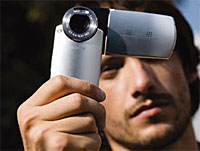 Sony’s boffins have announced the addition of a new hybrid camcorder/digital still camera to their Cyber-shot range.
Sony’s boffins have announced the addition of a new hybrid camcorder/digital still camera to their Cyber-shot range.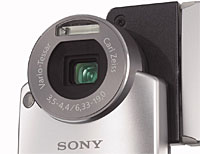 Designed to be used with one hand, the M2 features a slightly tilted lens axis which allows a more natural wrist position according to Sony.
Designed to be used with one hand, the M2 features a slightly tilted lens axis which allows a more natural wrist position according to Sony.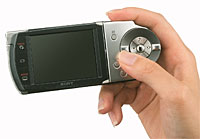 This automatically records five seconds of video before the still picture is taken, adding three more seconds of movie footage afterwards.
This automatically records five seconds of video before the still picture is taken, adding three more seconds of movie footage afterwards.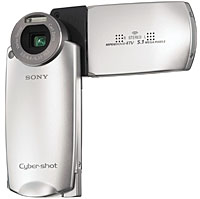 Those really wishing to inflict pain on their friends could insist on using the Slide Slow plus Movie function.
Those really wishing to inflict pain on their friends could insist on using the Slide Slow plus Movie function.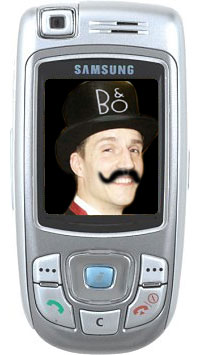 Hoity toity makers of expensive electronics for the well-heeled, Bang & Olufsen, have invited Samsung to the table in a joint project to design a new mobile phone.
Hoity toity makers of expensive electronics for the well-heeled, Bang & Olufsen, have invited Samsung to the table in a joint project to design a new mobile phone.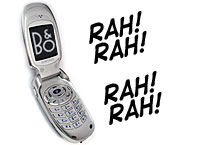 According to Sorensen, there will be just one phone at first with more models to follow.
According to Sorensen, there will be just one phone at first with more models to follow.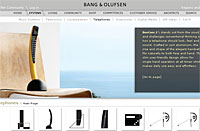 “We have positive expectations about this, but I know it is a niche product. The phone won’t appeal to all, but if only two percent of the market likes it, that’s good enough,” he added while tucking into a bowl of best Russian caviar.
“We have positive expectations about this, but I know it is a niche product. The phone won’t appeal to all, but if only two percent of the market likes it, that’s good enough,” he added while tucking into a bowl of best Russian caviar. Google’s virtual world domination plans continue afoot with the beta launch of their new blog search service, making the company the first major search engine to offer comprehensive blog and feed search capabilities.
Google’s virtual world domination plans continue afoot with the beta launch of their new blog search service, making the company the first major search engine to offer comprehensive blog and feed search capabilities. Google’s new service (sporting its trademark, no-frills interface) can be found at
Google’s new service (sporting its trademark, no-frills interface) can be found at  The Blogger version comes with a branded interface with an extra “use search options” link giving access to most common search advanced options, like searching in specific posts, entire blogs or specifying a date range to search within.
The Blogger version comes with a branded interface with an extra “use search options” link giving access to most common search advanced options, like searching in specific posts, entire blogs or specifying a date range to search within.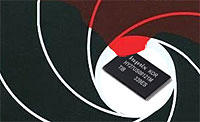 Hard drives are soon to go the way of 8 track cartridges and steam powered radios according to Samsung’s semi-conductor CEO Dr. Chang Gyu Hwang.
Hard drives are soon to go the way of 8 track cartridges and steam powered radios according to Samsung’s semi-conductor CEO Dr. Chang Gyu Hwang. With a cackle in his voice and a size nine sending a RAID array skywards, Hwang reckons that we’ll soon be seeing laptop memory cards with 32GB of memory, based on multiple 16Gb flash chips.
With a cackle in his voice and a size nine sending a RAID array skywards, Hwang reckons that we’ll soon be seeing laptop memory cards with 32GB of memory, based on multiple 16Gb flash chips.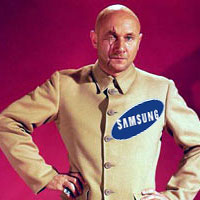 A big advantage of using flash memory in notebooks is that the technology is resistant to the sort of mechanical shocks that can often knacker a hard drive.
A big advantage of using flash memory in notebooks is that the technology is resistant to the sort of mechanical shocks that can often knacker a hard drive. Mobile network 3 has announced two new content packages aimed at getting more customers logging on to its mobile Internet services.
Mobile network 3 has announced two new content packages aimed at getting more customers logging on to its mobile Internet services. The network asserts that this limitation is to ensure that customers “can be sure that both front pages and sub-pages are viewable, that the speed of download is high and that all the site’s key activities are available”.
The network asserts that this limitation is to ensure that customers “can be sure that both front pages and sub-pages are viewable, that the speed of download is high and that all the site’s key activities are available”. From a technical perspective switchover it is not going to be a walk in the park. A phased switchover to digital by geographical area between 2008 and 2012. And we’ll only know how many people might be unable to get digital television once the analogue signal has been turned off and the digital signal boosted.
From a technical perspective switchover it is not going to be a walk in the park. A phased switchover to digital by geographical area between 2008 and 2012. And we’ll only know how many people might be unable to get digital television once the analogue signal has been turned off and the digital signal boosted. O2 has announced the launch of the o2 Xda Exec, the first PDA and mobile phone combo device to feature 3G.
O2 has announced the launch of the o2 Xda Exec, the first PDA and mobile phone combo device to feature 3G. Reflecting its business focus, the phone comes with Pocket Outlook, Word, Excel, Powerpoint and PDF viewers pre-installed and offers Bluetooth, Wireless LAN, 3G and tri-band GPRS connectivity.
Reflecting its business focus, the phone comes with Pocket Outlook, Word, Excel, Powerpoint and PDF viewers pre-installed and offers Bluetooth, Wireless LAN, 3G and tri-band GPRS connectivity.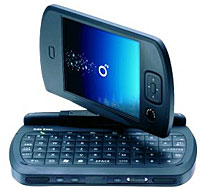 Combined with our service bundle, we believe that the O2 Xda Exec will build on the success of the Xda range, extending our market share still further into 2006.”
Combined with our service bundle, we believe that the O2 Xda Exec will build on the success of the Xda range, extending our market share still further into 2006.” Technical stuff:
Technical stuff: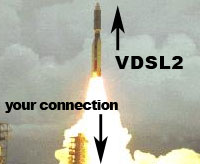 After demonstrating that high-definition television over copper was achievable through networks with increased bandwidth capabilities and compression techniques, France Telecom is looking to develop the technology and is currently testing VDSL2 transmission systems in its R&D Laboratories.
After demonstrating that high-definition television over copper was achievable through networks with increased bandwidth capabilities and compression techniques, France Telecom is looking to develop the technology and is currently testing VDSL2 transmission systems in its R&D Laboratories. All clear on that, now?
All clear on that, now?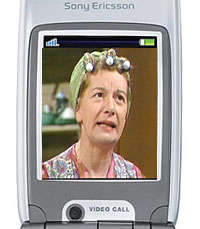 A report by Unstrung Insider claims that Mobile TV is set to become a breakthrough mass-market mobile data service, boosted by pioneering services offered by major global operators such as Orange, Vodafone, and SK Telecom.
A report by Unstrung Insider claims that Mobile TV is set to become a breakthrough mass-market mobile data service, boosted by pioneering services offered by major global operators such as Orange, Vodafone, and SK Telecom.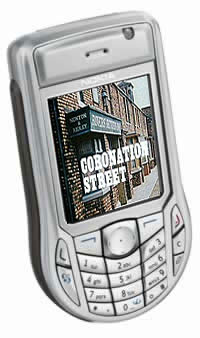 The report comments on the industry expectation that “one-to-many” mass-market mobile TV services may be more efficiently delivered over dedicated mobile broadcast networks using technologies such as DVB-H (Digital Video Broadcast-Handheld), DMB (Digital Multimedia Broadcast), and MediaFLO.
The report comments on the industry expectation that “one-to-many” mass-market mobile TV services may be more efficiently delivered over dedicated mobile broadcast networks using technologies such as DVB-H (Digital Video Broadcast-Handheld), DMB (Digital Multimedia Broadcast), and MediaFLO.